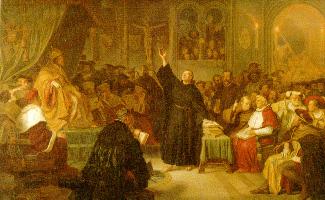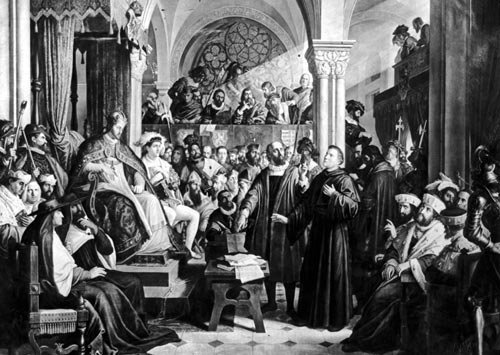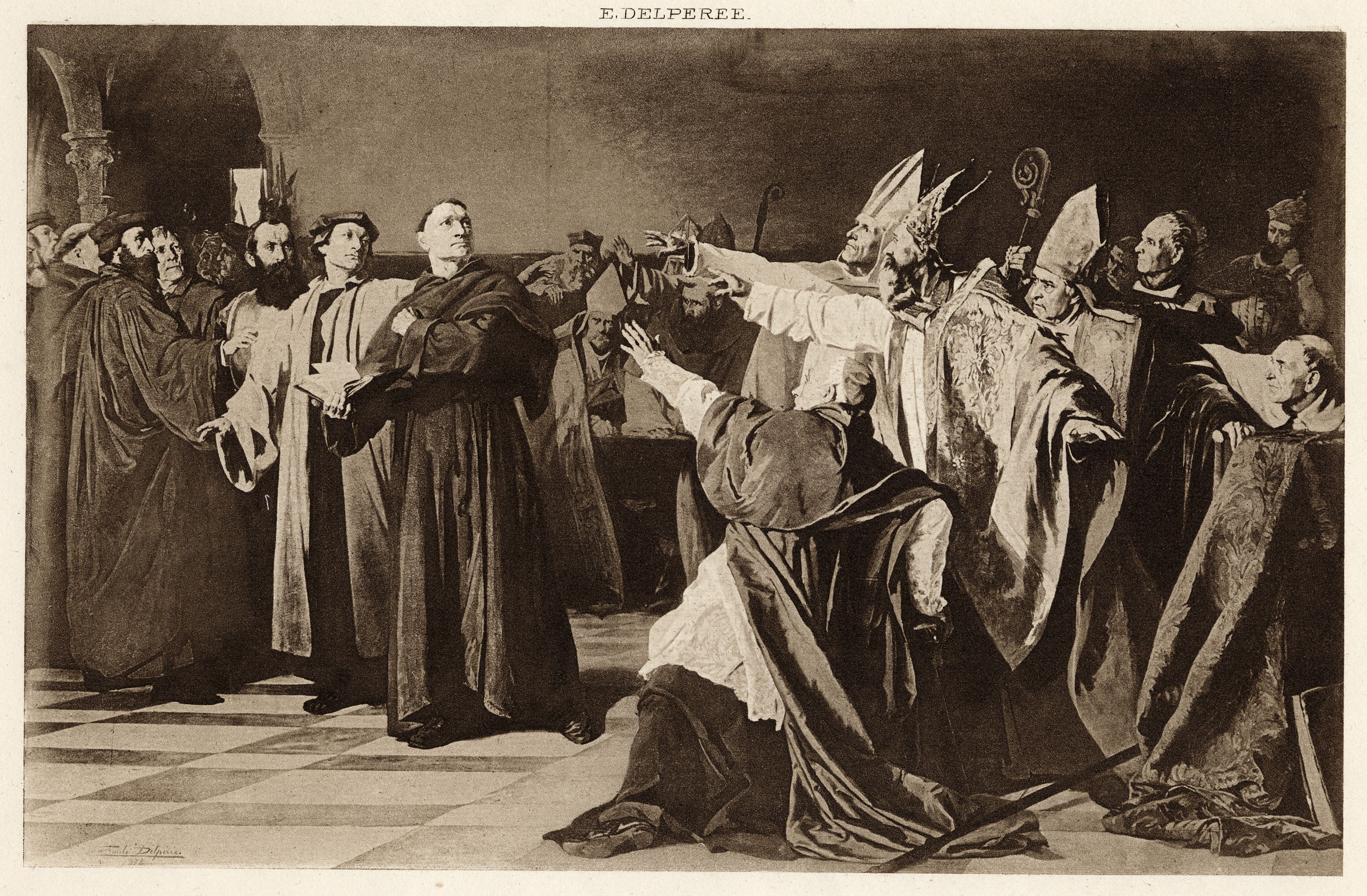Diet of Worms
The Diet of Worms was convened in 1521 by Charles V as a Reichstag meeting of the Electoral Board, the Imperial Prince Council and the City Council.
The main topics were the establishment of an imperial government for the administration of the empire, and which is important for the defense Reichsmatrikelordnung, particularly in view of the Turkish threat. At the same time agreed Charles V and his brother Ferdinand a delimitation of their respective possessions and thus laid the foundation for the division of the Habsburg dynasty into a Spanish and an Austrian line. As part of the Reichstag - though not before that even - also appeared Martin Luther, who was subsequently outlawed.
Drain and environment
The Reichstag was opened on January 27. It ended with the Imperial farewell on May 26, 1521. Emperor Charles V stayed since 28 November 1520 in the city on. The billeting of participants in the Reichstag and their followers were connected to loads of citizens. In the city "all desolate and wild ," was often had three or four people lost their lives in the day, the witness Dietrich Butzbach reported on 7 March. Lent was ignored, there was prostitution, there were jump- maintained and some drank on the strong wine to death. The papal nuncio, Jerome Aleandro was no longer safe on the day of his life, after he had called for action against Martin Luther on February 13. A violent intervention of imperial knight Franz von Sickingen seemed possible. The mood in the Wormser population was pro- Lutheran. A built by Lutherans printing brought anticlerical works of Ulrich von Hutten writings and pamphlets among the people.
Imperial government and Worms Erbteilungsvertrag
An imperial government under the presidency of Ferdinand (1503-1564), the brother of Charles V, which should represent the emperor during his absence, was used. This was due to the demand of German princes on the one hand used as a condition of his election as King of the Romans, and so he had to reconvening the committee concede in his capitulation. On the other hand, had to use such the Emperor, because he was also King of Spain and also ruled over an empire in which the " sun never set". It was therefore clear that he would often be absent.
At the same time the first time was between Charles and Ferdinand, a division of the two countries for Karl Spain, and Austria for Ferdinand decided ( Wormser agreement of 28 April 1521). The house contract covers the succession in Lower Austria and Inner Austria in favor of Ferdinand, in a ( for the time being kept secret ) agreement in the following year (Brussels 1522) which was also on Tyrol, Wurtemberg and extends the Swabian territories, bringing the Habsburg rule Austria consolidated in his other form. This agreement is also seen as a possible date for the separation of the Austrian Habsburg line of the Spanish Habsburgs. The later assumption of imperial dignity by the Austrians, who (with a brief interruption) persisted until the end of the empire in 1806, is the consequence of this regulation.
Reichsmatrikelordnung
The Reichsmatrikelordnung, a list of the territories to determine their income tax and defense services, it was decided. This formed the basis for the kingdom Turks assistance.
The Causa Lutheran
As part of the Reichstag, but not before this even, was 17-18. April, Martin Luther belongs. Luther had been condemned as a heretic and topped with excommunication; before the fact devoted an outlaw but a hearing of the accused was necessary because of the 1519 summoned by Charles V capitulation. Luther refused, citing the Bible to follow the royal request to withdraw his previously expressed views in his books. This was due mainly to the 1520 published books On the Freedom of a Christian, To the Christian Nobility of the German Nation from the Christian Estate and The Babylonian Captivity of the Church. Famous is his answer to the question of Charles V in his defense, if he wanted to revoke:
" ... If I am not convinced by testimonies of Scripture and plain reason; because neither the Pope nor the councils alone, I think there is established that they have often erred and contradicted themselves, so I'm through the passages of Holy Scripture, which I have mentioned, overcome my conscience is captive to the Word of God. Therefore I can not and will not recant anything, go against conscience to do something neither safe nor salutary. God help me, Amen! "
That he should have said at the end of this declaration, "Here I stand. God help me. I can not help it " is, indeed often found in the literature, however, guarantees neither contemporaries nor by the negotiating logs and not safe to occupy and in research. "Got kum to help me." The consequence of his refusal was the adoption of the Edict of Worms, in which Luther: The report of the contemporaries Konrad Peutinger, an Augsburg Council and purchase Lord, who was present at Worms at this hearing, however, is imperial ban was imposed. From the papal nuncio Jerome Aleandro, who had operated the particular thing that dated the design. On May 4, 1521 on the way home from the Diet, Luther was kidnapped in the secret order of his sovereign, the Elector Frederick of Saxony, and taken to the Wartburg in Eisenach in protective custody.










(1).jpg)